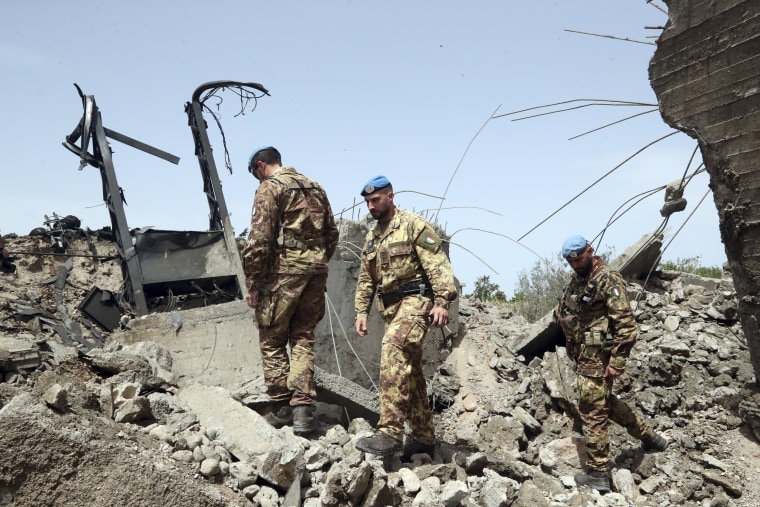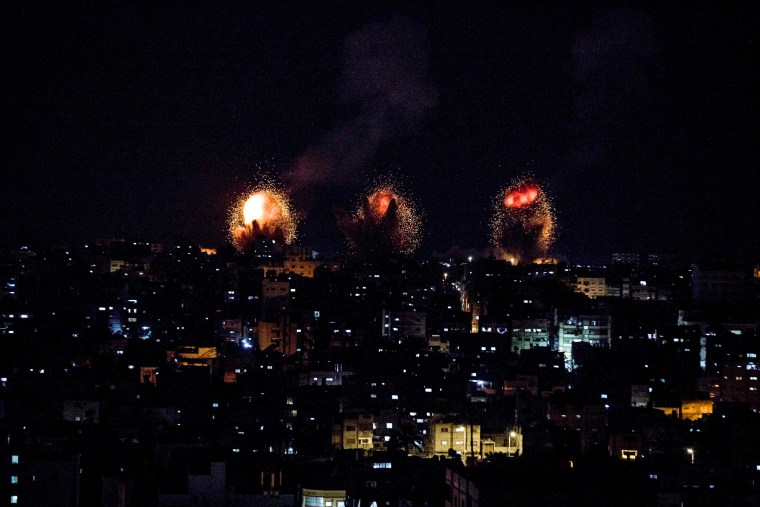Israel launched its biggest airstrikes on Lebanon in 17 years early Friday, after dozens of rockets struck the north of the country during the Jewish Passover holiday and sent tensions in the region spiraling.
The exchanges, which also come during the Muslim holy month of Ramadan and in the run-up to the Christian holy day of Easter, represent the most serious escalation between Israel and Lebanon since a 34-day war in 2006.
No group claimed responsibility for the attacks from Lebanon, although Israel pinned the blame on Hamas, the Palestinian group that controls the blockaded Gaza Strip. Israel said it had also hit 10 targets across Gaza on Friday.
Israeli officials also said they would not allow Hamas to operate from Lebanon, adding it would hold Lebanon responsible for any “hostile fire” from its territory.
Israel also said it was investigating whether Iran-linked Hezbollah was involved in the missile strikes on northern Israel.
At around 4 a.m. (9 p.m. Thursday ET), three Hamas targets were hit with airstrikes near Rashidieh, a town south of the Lebanese city of Tyre, Israel Defense Forces spokesman Rear Adm. Daniel Hagari said in a statement.
Of the 35 missiles launched from Lebanon on Thursday night, Israel's Iron Dome defense system intercepted 25, the IDF said.
The Lebanese army said it found a rocket launcher in the Marjeyoun Plain in southern Lebanon, containing unlaunched rockets.

Hamas condemned Israel’s retaliatory strikes, calling them “blatant Zionist aggression.
The United Nations Interim Force in Lebanon (UNIFIL), which has more than 10,000 peacekeeping troops from 48 countries, warned of a “serious escalation,” and said its commander, Maj. Gen. Aroldo Lázaro, was speaking to authorities on both sides.
“Both sides have said they do not want a war,” UNIFIL said in a statement. “The actions over the past day are dangerous and risk a serious escalation.”
Lebanon’s Foreign Ministry said Friday its permanent mission to the United Nations in New York would submit an official complaint over the bombing. It said in a statement that the attack “constitutes a flagrant violation of Lebanon’s sovereignty.”
Lebanon has for decades housed tens of thousands of Palestinian refugees, with militant groups recruiting from the population that began fleeing to Israel after the establishment of the Jewish state in 1949.
In 1982, Israel invaded southern Lebanon, fully withdrawing in 2000. It was during this time, and as a civil war raged in Lebanon, that Hezbollah was established. It has since become the most powerful political force in the country.

The barrage of missiles fired from Lebanon into northern Israel on Thursday followed violent scenes at the Al-Aqsa Mosque in Jerusalem where Muslim worshippers were forcibly removed by Israeli police during the holy month of Ramadan.
The Palestinian Authority said Israeli attacks in Gaza damaged a children’s hospital in Gaza, in contravention of the Geneva Convention.
“The Ministry of Health condemns the Israeli attacks that caused damage to Al-Durra Children’s Hospital, east of Gaza,” the authority said in a statement.
Hazem Qassem, a Hamas spokesman, indicated that Al-Aqsa would continue to be a catalyst for violence.
"The issue of Al-Aqsa Mosque will continue to be able to detonate the situation every time, because our people and their resistance will not pass the crimes of the occupation without a response to them," he said in a statement.
Meanwhile, two sisters were killed in a shooting attack on their car in the occupied West Bank, the IDF said on Twitter, adding that their mother sustained serious wounds. Soldiers initially thought they were attending the scene of a vehicle collision, but found the victims had been shot, the force said.
Magen David Atom, the emergency response service, said the incident took place near the Hamra junction in the Jordan Valley.
While it didn't claim responsibility for the shooting, Hamas issued a statement of congratulations for said what it called "the heroic shooting operation."
The Israeli military installed roadblocks and said it was pursuing the attackers. The office of Prime Minister Benjamin Netanyahu said he had been informed of the details and would hold a security briefing.
Patrick Smith reported from London, Lawahez Jabari reported from Tel Aviv and Mustafa Kassem from Beirut.
